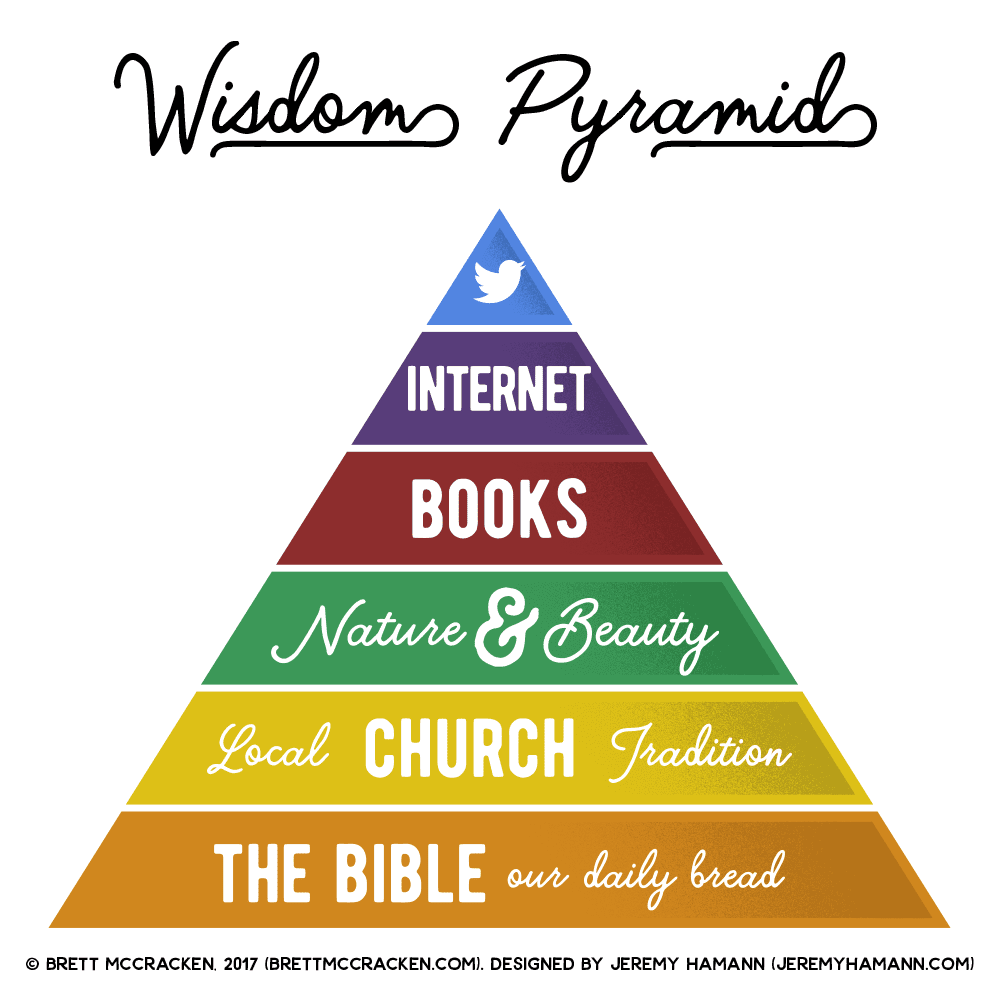
Editor’s Note: To start our New Year, we’re going to be taking an in-depth look at author Brett McCracken’s proposed “Wisdom Pyramid.” Over the course of six days, we’ll look at the roles that the Bible, the church, nature and beauty, books, the internet, and social media play in our lives. This is the final post—to start reading the series from the beginning, click here.
Day Six
Social Media
The power of social media grows every day. According to Forbes, over 78% of Americans have a social network profile. More than three quarters of our population is doing some sort of image management or cyber-stalking when they’re online. In the real world, we share our thoughts, go shopping, look in the mirror, and engage in politics…and then we do it all over again, and more, on social media, often with strangers.
Our opinions of everything from haircuts to classmates to church to our president are swayed by likes and comments on Twitter and Instagram. We buy new apps, mascara, and music based on glowing reviews in private groups on Facebook. We see everyone from kids to world leaders bullying and trolling on Twitter, screenshots blazing out on the nightly news and talk shows.
Social media can be a minefield. Without a strong tether, without wisdom, our beliefs about ourselves and our world will sway in the strong, unrelenting wind created by the often unfiltered opinions of 2.44 billion people.
But social media can have hugely positive impacts, as well. The World Economic Forum reports that among the 2.44 billion people using social media, many are making positive changes in public health, government, disaster response, human rights, and climate change. We are more exposed to major issues, big ideas, and global crises. We learn from each other’s personal tragedies and successes about who, what, when, where, and how to respond to be a part of a world of progress.
But of course, some days on social media we just roll our eyes at others’ opinions, promote ourselves, watch movie trailers, and become P.I.’s looking for ex-boyfriends.
Whether we realize it or not, our time on social media matters. It shapes our opinions, buying habits, self-image, and political system. It delights and infuriates us. It connects and divides us as people.
 Questions:
Questions:
- How often do you check your social media accounts for likes and comments? Do you think you are addicted, or have you slayed this dragon? How do you define “addiction” to social media? Does your definition always leave you safely just on the other side?
- Remember the verse about guarding our minds? Or this one: “Whatever is true, whatever is honorable, whatever is just, whatever is pure, whatever is lovely, whatever is commendable, if there is any excellence, if there is anything worthy of praise, think about these things”? Are the people you follow on social media helping you “think about these things?” Does your activity online reveal a heart focused on wisdom?
- Do you spend more time on social media then reading the Bible, connecting with your church, reveling in the world God has created, or reading books? What could you add or subtract to flip your pyramid?
Next Steps:
- The most common reason people cite for social media usage is “keeping in touch with family and friends.” Monitor yourself for a week: how much time do you actually spend sharing family stories with your grandma or connecting in meaningful dialogue with people you care about? How much do you spend pining over Pinterest or lurking on strangers’ vacation photos?
- Go through your social media accounts. Delete or unfollow the people that pull you away from Biblical wisdom and godly living. Pray for humility and discernment before attempting this: our desire to be cool, relevant and informed is strong.
- Consider a social media fast. Hide all the social media apps on your device for a set number of hours, or even a whole day. Perhaps ask a friend to do it with you. If this is too hard, consider praying about the desire and will to try it before the end of the month.
- Most of us fall into the traps of image management and instant gratification on social media. Prayerfully consider if your pictures, words, and comments are reflecting your true self with integrity. Are you giving more than you receive online?
- Search your social media platforms for people and causes that make your heart sing. Add ten that will delight and inform you.
- Do you have a trusted family member or friend—perhaps from an older generation, but not necessarily—who doesn’t use social media? Ask this person for feedback on the amount of time you spend on social media.
Building Your Wisdom Pyramid: Now What?
- Before you click off this screen, write down three questions or next steps from our journey through the Wisdom Pyramid that caught your attention. You could write on a post-it to put on the back of your phone, write in a journal, or send yourself a text.
- Visit this series again next week, and choose three more questions or next steps to take. Consider asking a friend or a small group to join you.
- Share what’s working for you with us. In the comments below, tell us what Bible studies, books, websites, and social media accounts are igniting your wisdom and understanding.
We’ve covered a lot of ground in six days, and there’s a lot to think about here. Perhaps some of these questions have left you feeling agitated and defensive. I know I feel that way, but let’s not lose heart: “Do not forsake wisdom, and she will protect you; love her, and she will watch over you. The beginning of wisdom is this: Get wisdom. Though it cost all you have, get understanding.” (Proverbs 4:6-7)
Thank you for exploring the Wisdom Pyramid with us through this series! We hope you feel encouraged, convicted and equipped to grow in wisdom in 2018.
Aimee Fritz delights in telling long, true stories about compassion, souls, and big mistakes among the everyday absurdities of her suburban life. Long ago she consulted companies, churches, and nonprofits. Now she runs Family Compassion Focus to funnel all that into helping people become lovable and loving World Changers. She recently co-wrote the Family Toolkit (free download) for Kent Annan’s Slow Kingdom Coming: Practices for Doing Justice. Loving Mercy, and Walking Humbly in the World (IVP). To arrange a meeting, a talk, or an article, contact Aimee via e-mail (familycompassionfocus@gmail.com).


